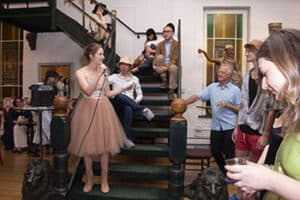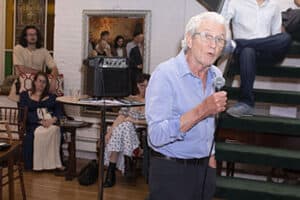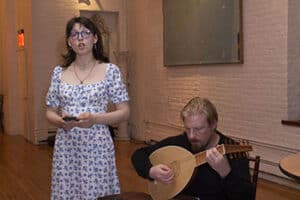The De Vere Ball
By Hank Whittemore

(NEW YORK) Edward de Vere would have loved it. On the pleasant, warm Saturday evening of 13 August 2022, in the “bohemian chic” section of downtown Manhattan known as the West Village, about 100 millennials made their way through narrow winding streets to gather in the spacious, elegant ballroom on the second floor of an historic mansion.
In colorful, festive attire, they raised glasses in toasts to the Earl of Oxford as the true author of the Shakespeare works.
Under way was The De Vere Ball, organized and led by multi-talented Phoebe Nir, a young scholar, playwright and screenwriter known Off-Broadway for her work in musical theatre. She has also become an indefatigable social media producer and host, turning out Tik Toks about the Authorship Question (@phoebe_devere) and the Oxfordian movement, using creative visuals and providing information with rapid-fire delivery that the fast-talking Earl himself would applaud.
“As an amateur Oxfordian enthusiast,” Ms. Nir said, “I’m throwing this Ball in the hopes of building an Oxfordian discourse community within New York’s downtown creative scene, and to target various influencers (such as Anna Khachiyan and Dasha Nekrasova, co-hosts of the hugely influential Red Scare podcast) to join us as guests.” The event was held in the former Alger House at 45 Downing Street, an elegant townhouse completed in 1915.

These artists, scholars, writers and filmmakers in their twenties and thirties represent a new generation drawn not only to the great poems, plays and sonnets, but, as well, to the exciting prospect of exposing the myth of the Stratford man as great author and, thereby, replacing centuries of false history with the truth. The crowd included hipsters who had come out of curiosity to learn what this “Oxford Theory” might be about, while others had already become acquainted (some extensively) with both the Shakespeare works, the Authorship Question, and Edward de Vere himself. Mingling at the cocktail hour, their loud chatter echoed off the high-beamed ceiling and stained-glass windows.
On tables were stacks of a new compact magazine titled TAKE THE DE VERE PILL: Explorations in Oxfordianism, designed by Sammy Dalati of the magazine Antiques with creative director Josefa Westerman, and edited by Ms. Nir with associate editor Larisa Golovko. The 63 high-quality black-and-white pages contain a dozen essays from various angles, by writers including longtime Oxfordians such as Professor Felicia Londre of the University of Missouri at Kansas; and me; with featured articles from individuals in different fields such as Katherine Dee, who contributes “The Daily Scroll” for Tablet Magazine, and Daniel Cowan, a Canadian researcher and expert on Hermeticism. (His full essay can be read online at sixdaystheatre.substack.com). Bob Meyers, president of the Shakespeare Oxford Fellowship, provided a welcome.
Resources for further study are presented at the end of the magazine.

The toasts to Oxford began with beautiful Elizabethan singing by Salome (a.k.a. Pariah the Doll) accompanied by Dan Keene on the lute. As an invited guest from the Oxfordian community, I then recited two sonnets (numbers 55 and 81), having chosen them primarily because they appear to express Oxford’s urgent need to preserve the high stature of the younger man (whom I believe to be Henry Wriothesley, third Earl of Southampton) for future generations of readers.** Further comments came from Curtis Yarvin, who runs the blog Gray Mirror, and Jack Mason, host of the perfume podcast The Perfume Nationalist.
All this was followed by more lively chatter, music, dancing and discussions of how, as Ms. Nir writes in her “Letter from the Editor” of the new magazine, “Oxfordianism can deepen the bliss, and even the mystery, of engaging with Shakespeare.”
Why does it matter who wrote Shakespeare?
In the open letter, Phoebe Nir gives her personal answer:

“Edward de Vere gives me hope. And in these trying and uncertain times, humanity’s best path forward is the one in which we’re able to draw inspiration from the greatest poet who ever lived. Just as the Founding Fathers modeled themselves after heroic examples from Plutarch’s Lives, perhaps we might navigate the unique challenges of the 21st century by harnessing our own creativity, compassion, and genius – qualities that no one has ever embodied more fully than Edward de Vere.”
**
Nor Mars his sword nor war’s quick fire shall burn
The living record of your memory.
‘Gainst death and all-oblivious enmity
Shall you pace forth; your praise shall still find room
Even in the eyes of all posterity… Sonnet 55, 7-10
Your name from hence immortal life shall have,
Though I (once gone) to all the world must die…
Your monument shall be my gentle verse,
Which eyes not yet created shall o’er-read.
And tongues to be your being shall rehearse… Sonnet 81, 5-6, 9-11
Hank Whittemore is a retired professional actor, screenwriter and author of 14 books. In the field of Oxfordian studies, he has written “The Living Record: Shakespeare, Succession and the Sonnets,” as well as “100 Reasons Shake-Speaker was the Earl of Oxford.”
Membership dues cover only a fraction of our budget, including all our research, preservation and programming. Please support the SOF by making a gift today!
Blue Boar Tavern: Wassail Q&A
Tuesday Dec. 17, 8pm E / 5pm P
Sign up below for event invites!
